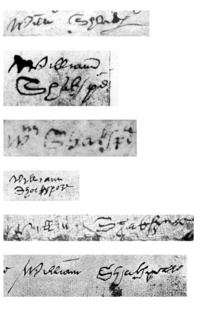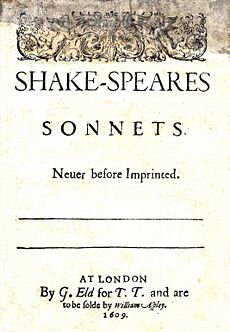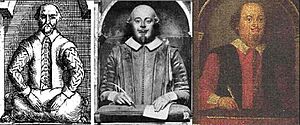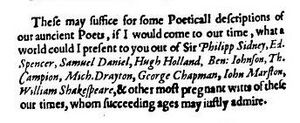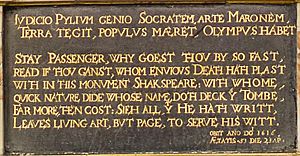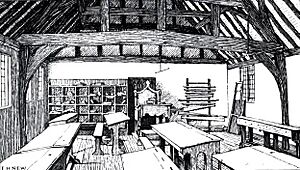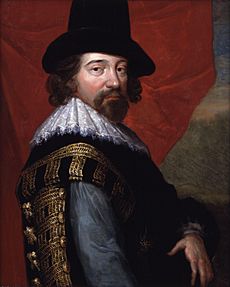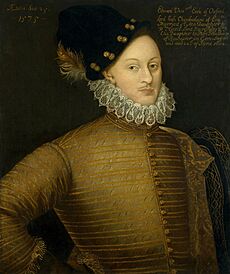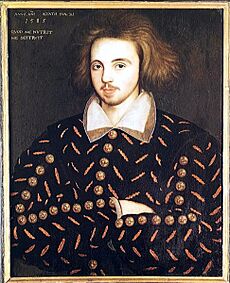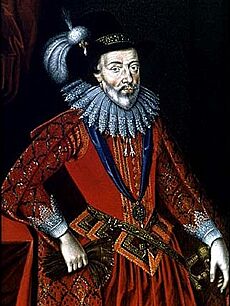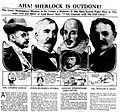Shakespeare authorship question facts for kids
Template:Imagemap Image:ShakespeareCandidates1.jpg|thumb|alt=Portraits of Shakespeare and four proposed alternative authors|Oxford, Bacon, Derby, and Marlowe (clockwise from top left, Shakespeare centre) have each been proposed as the true author. poly 1 1 105 1 107 103 68 104 68 142 1 142 Edward de Vere, 17th Earl of Oxford poly 107 1 214 1 214 143 145 142 145 104 107 104 Francis Bacon rect 68 106 144 177 William Shakespeare poly 1 144 67 144 67 178 106 179 106 291 1 290 Christopher Marlowe (putative portrait) poly 145 143 214 143 214 291 108 291 107 179 144 178 William Stanley, 6th Earl of Derby Template:/imagemap
The Shakespeare authorship question is a long-standing debate. It asks if someone other than William Shakespeare of Stratford-upon-Avon wrote the famous plays and poems attributed to him. People who believe this are called Anti-Stratfordians. They think Shakespeare of Stratford was a public figure used to hide the real author's identity. This might have been because of the author's social status, safety, or gender.
Most experts on Shakespeare and history see this idea as a fringe theory. They usually mention it only to explain why it's not true. The idea first came up in the mid-1800s. At that time, Shakespeare was widely seen as the greatest writer ever. People wondered how someone from a simple background could create such amazing works. This led to questions about who the real author was.
Over 80 different people have been suggested as the true author. The most popular ones are Sir Francis Bacon, Edward de Vere, 17th Earl of Oxford, Christopher Marlowe, and William Stanley, 6th Earl of Derby. Supporters of these other candidates say their choice had more education or knew more about royal life. However, most scholars say that looking for clues about an author's life in their stories is not a reliable way to figure out who wrote them. They point to official papers, comments from other writers, and public records that all name William Shakespeare as the author. No such direct proof exists for any other candidate. Also, no one questioned Shakespeare's authorship during his lifetime or for hundreds of years after his death.
Despite what most scholars believe, some well-known people have supported the idea of a different author. They want the authorship question to be seen as a real area of study. They also hope one of the other candidates will be accepted as the true author.
Contents
What is the Shakespeare Authorship Question?
People who doubt Shakespeare's authorship often try to show that William Shakespeare of Stratford could not have written the works. They then suggest someone else did. They often believe there was a secret plan to hide the real author's identity. This, they say, explains why there's no direct proof for their chosen author and why records support Shakespeare.
Many Anti-Stratfordians believe the Shakespeare plays show a lot of learning. They think the author knew foreign languages, geography, and how the royal court worked. They argue that only a highly educated person or someone close to the court could have written them. Records about William Shakespeare's life include things like his baptism, marriage, and death. They also show tax records, lawsuits about money, and property deals. There are no records showing he went to school or owned books. Also, no personal letters or original writings by Shakespeare survive. To some, these missing details suggest the author was not the man from Stratford.
Famous people like Walt Whitman, Mark Twain, Helen Keller, and Sigmund Freud have found these arguments convincing. Their support is often used by Anti-Stratfordians.
Scholars, on the other hand, use direct evidence to confirm Shakespeare's authorship. This includes names on book covers, government records, and comments from other writers and actors of the time. They say that missing documents are common for that period. Scholars argue that all this evidence together confirms William Shakespeare as the author. These are the same rules used to credit works to other writers from that era.
Why do some people doubt Shakespeare's authorship?
Little is known about Shakespeare's personal life. Some Anti-Stratfordians see this as a sign that he wasn't the author. They even suggest there was an organized effort to remove records about him, like school papers, to hide the real author's identity.
Shakespeare's background and family
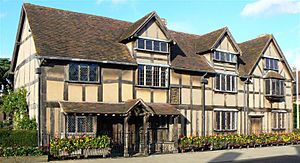
Shakespeare was born, grew up, and was buried in Stratford-upon-Avon. He kept a home there even while working in London. Stratford was a market town of about 1,500 people, known for sheep farming and wool trading. Anti-Stratfordians often say the town was not a place where a genius could grow up. They sometimes describe Shakespeare as uneducated.
Shakespeare's father, John Shakespeare, made gloves and was a town official. His mother, Mary Arden, came from a local noble family. Both parents signed their names with a mark, not a signature. This suggests they might not have been able to write. There's also no clear proof that Shakespeare's daughters could read or write well. Anti-Stratfordians see this as proof of a family that wasn't very educated. They compare this to Shakespeare's plays, which show women reading and writing letters. They argue the author must have come from a more educated family.
Some Anti-Stratfordians believe Shakespeare's background doesn't match the author of the plays. The plays show knowledge of court life, foreign countries, and noble sports like hunting and falconry. They also say the plays show little sympathy for common people.
Did Shakespeare have enough education?
There is no official record of Shakespeare's education. This is often part of the arguments against his authorship. The free King's New School in Stratford was near his childhood home. While no student lists survive, grammar schools at the time taught Latin, classic texts, and public speaking. The headmasters were graduates of Oxford. The lack of records leads some to believe Shakespeare had little or no education.
Anti-Stratfordians also wonder how Shakespeare could have such a large vocabulary. The author's vocabulary is estimated to be between 17,500 and 29,000 words. No letters or original writings by Shakespeare exist. His six surviving signatures are sometimes called "an illiterate scrawl." This is used to suggest he could barely write.
Was "Shakespeare" a fake name?
William Shakespeare's name was spelled differently in his surviving signatures than on most of his book covers. His last name was spelled many ways in documents. This is seen as proof that he was not the same person who wrote the works. Instead, they believe the name was a pseudonym (a fake name) for the real author.
The name "Shake-speare" or "Shak-spear" was sometimes hyphenated on book covers. This hyphen is seen by most Anti-Stratfordians as a sign of a fake name. They argue that made-up names were often hyphenated in plays.
Reasons for using a fake name vary. Rich people like Derby and Oxford might have used one to avoid social shame. In their time, it was not seen as proper for nobles to write plays for the public. For commoners, a fake name might have been used to avoid trouble with the law. For example, some suggest Christopher Marlowe used one to avoid being arrested.
What about Shakespeare's death?
Shakespeare died on April 23, 1616, in Stratford. He left a will that listed his property. The will does not mention any personal papers, books, poems, or the 18 plays that were not yet published. The will does mention money gifts to fellow actors for them to buy mourning rings.
There are no records of public mourning or poems about Shakespeare's death until seven years later. These appeared in the First Folio of his plays.
Some people, called Oxfordians, think the phrase "our ever-living Poet" in the 1609 Sonnets dedication meant the poet had already died. Oxford died in 1604, five years before.
Shakespeare's monument in Stratford shows a statue of him holding a pen. An early drawing of this statue from 1656 looks different from how it looks today. Some theorists argue the statue was changed to hide the real author's identity. They think it originally showed a man holding a sack of grain or wool. This was suggested to honor John Shakespeare, William's father, who was a wool dealer. However, a painting from before 1748 shows the monument looking much like it does now.
Why do most scholars believe Shakespeare wrote the plays?
Almost all academic experts on Shakespeare believe that William Shakespeare of Stratford-upon-Avon was the author. He was born in 1564 and died in 1616. He became an actor and a part-owner in the Lord Chamberlain's Men. This acting company later became the King's Men. They owned the Globe Theatre and had special rights to perform Shakespeare's plays. Shakespeare was also allowed to use the title "gentleman" after 1596.
Scholars see no reason to think the name was a fake or that the actor was a front for someone else. Records from that time clearly name Shakespeare as the writer. Other playwrights like Ben Jonson and Christopher Marlowe came from similar backgrounds. No one at the time ever said they doubted Shakespeare's authorship. While some details about Shakespeare's life are missing, this is true for many writers of that time.
Scholars use the same methods to prove Shakespeare's authorship as they do for other writers. They use historical records and studies of writing style. They say that claiming "no evidence" exists for Shakespeare's authorship is a mistake in logic. They criticize the methods used to suggest other authors as unreliable. This is why so many different candidates have been suggested. They also say that expecting an author to reveal their own life in their work is a modern idea. It wasn't common during Shakespeare's time.
What historical evidence supports Shakespeare's authorship?
Historical records clearly state that William Shakespeare wrote the plays and poems. His name appeared on book covers. He was also named as a well-known writer at least 23 times during his lifetime. Several people from his time confirmed that the playwright was also an actor. Official records also show that the man from Stratford was an actor using his own name.
In 1598, Francis Meres named Shakespeare as a playwright and poet. He said Shakespeare was one of the authors who "mightily enriched" the English language. He listed twelve plays by Shakespeare, including some not published at the time. He also said Shakespeare wrote some plays published without an author's name before 1598. Meres also mentioned Shakespeare's "sug[a]red Sonnets among his private friends" 11 years before they were published.
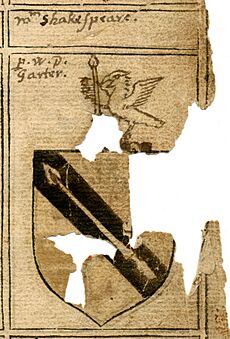
In Elizabethan England, William Shakespeare was allowed to use the title "gentleman" after his father's death in 1601. This was because his father was granted a coat of arms in 1596. This title was often used with his name in official and literary records. This helps confirm that William Shakespeare of Stratford was the author. For example, two official records from 1600 and 1607 list plays as "Wrytten by mr Shakespere" or "Mr William Shakespeare his historye of Kynge Lear."
Other writers also called him "Master" or "Mr. Will: Shake-speare." After Shakespeare's death, Ben Jonson clearly named William Shakespeare, gentleman, as the author in his praise poem in the First Folio (1623). Other poets also identified Shakespeare the gentleman as the author in their poems in the First Folio.
What legal evidence supports Shakespeare's authorship?
Evidence from his time, including legal documents, supports Shakespeare's authorship. People who knew him as an actor and playwright also confirmed his identity.
Sir George Buc was in charge of supervising and approving plays from 1603 to 1622. He was very careful about giving credit to the right authors. In 1607, he personally approved King Lear for publication, stating it was written by "Master William Shakespeare."
In 1602, Ralph Brooke questioned why Shakespeare's father was granted a coat of arms. Brooke called Shakespeare "Shakespear ye Player." However, the grant was defended by important officials, including William Camden, a leading historian. Camden also listed Shakespeare as one of the "most pregnant witts of these ages our times."
How did other writers and actors recognize Shakespeare?
Actors John Heminges and Henry Condell worked with Shakespeare for over 20 years. In the 1623 First Folio, they wrote that they published his plays "only to keep the memory of so worthy a Friend, & Fellow alive, as was our Shakespeare." The playwright and poet Ben Jonson knew Shakespeare from at least 1598. He praised Shakespeare as a person, saying, "I loved the man, and do honour his memory... He was (indeed) honest, and of an open, and free nature."
Other playwrights also wrote about Shakespeare. In a play from around 1606, an actor says, "Why here's our fellow Shakespeare puts them all down." This shows he was known as a successful playwright.
When a book of poems called The Passionate Pilgrim was published with Shakespeare's name on it in 1612, another writer, Thomas Heywood, protested. He said the author was "much offended" because his name was used without permission. This suggests Shakespeare was indeed the author who was upset. Heywood later wrote a poem calling him "Mellifluous Shake-speare."
What did Shakespeare's will and monument say?
The monument to Shakespeare in Stratford, built before 1623, has a plaque calling him a writer. It compares him to famous figures like Nestor, Socrates, and Virgil. This monument was mentioned in the First Folio. Other records from the early 1600s also identify it as a memorial to Shakespeare and include the inscription.
Shakespeare's will, from March 25, 1616, left money to his "fellows John Hemynge Richard Burbage and Henry Cundell." These men were actors with Shakespeare in the King's Men. Two of them later edited his collected plays. Some Anti-Stratfordians have questioned these gifts, saying they were added later as part of a secret plan. However, the will was officially approved in London in June 1616, with these gifts included.
John Taylor was the first poet to mention Shakespeare's death in print in 1620. Ben Jonson wrote a poem praising the First Folio image of Shakespeare. He also wrote a long poem praising Shakespeare as a playwright, poet, and actor. He called him "Sweet Swan of Avon!" linking him to the river in Stratford.
Leonard Digges wrote a poem in the 1623 First Folio, referring to "thy Stratford Moniment." Digges lived near Stratford and was the stepson of a man Shakespeare named in his will. Another poet, William Basse, wrote a poem suggesting Shakespeare should be buried in Westminster Abbey. This poem was widely shared and clearly referred to Shakespeare of Stratford.
What do Shakespeare's works tell us about his authorship?
Shakespeare's works are among the most studied in history. Comments from his time and studies of his writing style support the idea that the author had an education and life similar to William Shakespeare.
Ben Jonson and Francis Beaumont mentioned Shakespeare's lack of deep classical learning. No records suggest he was a great scholar. This matches some mistakes in his plays, like mispronouncing classical names. It has been suggested that Shakespeare got most of his classical knowledge from a Latin dictionary used at the Stratford Grammar School.
Later critics like Samuel Johnson said Shakespeare's genius came from his sharp observations, not from books. Many claims about his huge vocabulary are exaggerated. Studies show his vocabulary size and word use are similar to other writers of his time. His vocabulary seems large because he wrote more plays than others, and his plays had many different characters and settings.
Shakespeare's plays are different from those by university-educated writers. He avoided showing off his knowledge of Latin or classical drama rules. His classical references came from the grammar school curriculum. This included Latin grammar, Caesar, Livy, Virgil, Horace, Ovid, and others. Shakespeare's plays also mention grammar school texts and teachers.
Since 1987, a study called the Claremont Shakespeare Clinic has used computers to compare Shakespeare's writing style to 37 other authors. The study found that Shakespeare's work has consistent patterns. This suggests he was one person, not a group. It also showed that none of the other suggested authors could have written Shakespeare's works. This includes Oxford, Bacon, and Marlowe.
Shakespeare's writing style changed over time, like other artists. His later plays, like The Winter's Tale and The Tempest, have a style similar to other writers of his later period. This style is very different from his earlier plays.
Studies of the plays also show that Shakespeare worked with other playwrights. For example, in The Two Noble Kinsmen, written with John Fletcher, characters act as if they are meeting for the first time in one scene, even though Shakespeare had them meet in an earlier scene. This suggests they were following a general plan, not finishing a script by an already dead writer.
Who are the main alternative candidates?
More than 80 people have been suggested as the true author of Shakespeare's works. However, only a few have gained much attention. Some theories also suggest a group of authors wrote the plays.
Group theories
The idea of a group of authors began in the mid-1800s. Delia Bacon suggested that a group of politicians, led by Walter Raleigh and including Sir Francis Bacon, wrote the plays. They wanted to share advanced political ideas but couldn't do so openly.
Later, Gilbert Slater suggested seven authors: Francis Bacon, Edward de Vere, Sir Walter Raleigh, William Stanley, Christopher Marlowe, Mary Sidney, and Roger Manners. Some group theories even include William Shakespeare of Stratford as the group's manager or public face.
Sir Francis Bacon
Sir Francis Bacon was a leading thinker of his time. He was a lawyer, philosopher, writer, and scientist. His supporters point to similarities between his writings and Shakespeare's. For example, Bacon wrote, "Poetry is nothing else but feigned history," and Shakespeare wrote, "The truest poetry is the most feigning."
Baconians believe Bacon hid his true ideas about government in Shakespeare's plays. They say this was because his ideas were dangerous to the monarchy. They also point to the many legal terms in Shakespeare's plays, arguing that only a lawyer like Bacon would know so much about the law.
Because Bacon knew about secret codes, early Baconians thought he left hidden messages in Shakespeare's works. Many claimed to find these codes, which they said proved Bacon was the author. For example, they claimed a Latin word in Love's Labour's Lost could be rearranged to say, "These plays, the offspring of F. Bacon, are preserved for the world."
Edward de Vere, 17th Earl of Oxford
Since the 1920s, Edward de Vere, 17th Earl of Oxford, has been the most popular alternative candidate. Oxford was a nobleman who supported acting groups. He was known as a court poet and playwright. While his poems survive, none of his plays do. He was also known for supporting writers.
Oxfordians believe that certain clues in literature suggest Oxford wrote anonymously. They also note his connections to the London theatre and other playwrights. They point to his family connections, his knowledge of court life, his education, and his travels to places mentioned in Shakespeare's plays. They also see similarities between Oxford's life and events in Shakespeare's plays and poems. They claim to have found many marked passages in Oxford's Bible that appear in Shakespeare's plays.
Oxfordians say Oxford used "Shakespeare" as a fake name because nobles were not supposed to write plays for the public. Another reason given is the "Prince Tudor theory." This theory suggests that Oxford was secretly the lover of Queen Elizabeth and they had a son, Henry Wriothesley. According to this theory, Oxford wrote the plays to remember their secret love.
Oxfordians believe the dedication to the Sonnets (published in 1609) means the author had died before then. Oxford died in 1604. They also say that plays showing changes or collaborations were left unfinished by Oxford and completed by others after his death.
Christopher Marlowe
The poet and playwright Christopher Marlowe came from a similar background to Shakespeare. His father was a shoemaker. Marlowe was two months older than Shakespeare and went to Cambridge University. He was known for using blank verse in plays, and his works greatly influenced Shakespeare's. Most of his plays were performed before 1593.
The Marlovian theory suggests that Marlowe's death on May 30, 1593, was faked. They believe Thomas Walsingham and others helped him fake his death. This was supposedly to help Marlowe avoid being arrested for his beliefs. The theory then claims Shakespeare was chosen as the public face behind whom Marlowe continued to write his plays. This idea is based on the details of his supposed death and similarities in writing style between Marlowe and Shakespeare.
Marlovians note that Venus and Adonis, the first work linked to Shakespeare, was sold just 13 days after Marlowe's reported death. It was registered without an author's name earlier that year. They have also found many similar words and phrases between Marlowe's and Shakespeare's works.
William Stanley, 6th Earl of Derby
William Stanley, 6th Earl of Derby, was first suggested as a candidate in 1891. A spy reported in 1599 that Derby was "busy writing comedies for the common players." That same year, Derby helped fund a children's acting company. He also had his own acting company. Derby was born three years before Shakespeare and died in 1642, so his life span fits the dates of the plays. His initials were W. S., and he was known to sign himself "Will."
Derby traveled in Europe in 1582. Love's Labour's Lost is set in Navarre, a place he might have visited. Derby married Elizabeth de Vere. Her grandfather, William Cecil, is thought by some to be the inspiration for the character Polonius in Hamlet. Derby was also connected to the brothers William Herbert and Philip Herbert. These two were the "Incomparable Pair" to whom Shakespeare's First Folio was dedicated.
Images for kids
-
Delia Bacon was the first writer to formulate a comprehensive theory that Shakespeare was not the writer of the works attributed to him.
-
Orville Ward Owen constructed a "cipher wheel" that he used to search for hidden ciphers he believed Francis Bacon had left in Shakespeare's works.
-
Rhys Ifans played Edward de Vere in the 2011 film Anonymous
-
Title page of the 1634 quarto of The Two Noble Kinsmen by John Fletcher and Shakespeare
See also
 In Spanish: Autoría de las obras de Shakespeare para niños
In Spanish: Autoría de las obras de Shakespeare para niños
 | Bessie Coleman |
 | Spann Watson |
 | Jill E. Brown |
 | Sherman W. White |


